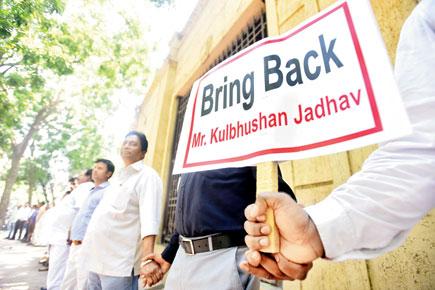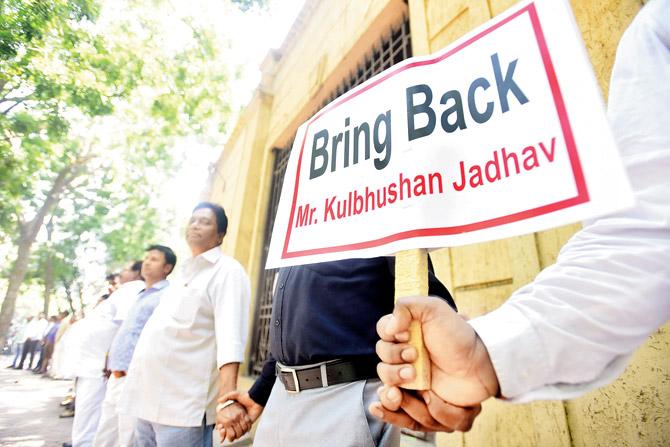Our bankrupt Kashmir policy and muscular approach to Pakistan have yielded little, as the trial over an alleged spy's fate begins today


The ICJ will begin public hearings from today in the case of former Indian Navy officer Kulbhushan Jadhav, who has been sentenced to death by Pakistan. FILE PIC
 Kulbhushan Jadhav's case has gotten unnecessarily complicated, and only because of two competing sets of cussedness. On one side is the Government of India, meaning Prime Minister Narendra Modi and National Security Advisor Ajit Doval, and on the other, is Pakistan's Army, whose Corps Commanders act as a Board of Directors regardless of who the Army Chief (or Directorate General for Inter-Services Intelligence) is.
Kulbhushan Jadhav's case has gotten unnecessarily complicated, and only because of two competing sets of cussedness. On one side is the Government of India, meaning Prime Minister Narendra Modi and National Security Advisor Ajit Doval, and on the other, is Pakistan's Army, whose Corps Commanders act as a Board of Directors regardless of who the Army Chief (or Directorate General for Inter-Services Intelligence) is.
ADVERTISEMENT
Jadhav, a former Indian naval officer, was arrested in March 2016 by Pakistan, which accused him of being a Research and Analysis Wing (RAW) agent sent by India to run networks of rebels in Balochistan. India expectedly denies this and says the Pakistan military (or its proxies) abducted Jadhav from Iran and coerced a video confession from him.
Pakistan tried Jadhav in a military court, found him guilty and sentenced him to death. It happened fast and unexpectedly, and India objected that Jadhav was even not allowed consular access. The death penalty was taking matters too far. India then went to the International Court of Justice (ICJ) at The Hague, which asked Pakistan to stay the hanging. The first hearing is today.
All things considered, Jadhav won't be hanged; the Pakistanis in private regret that it has become such an issue. Also, when it comes to espionage, governments worldwide usually negotiate a low-profile swap. Since Doval and his Pakistani counterpart, Lt Gen Nasser Khan Janjua, reportedly have a rapport, so some sort of a quiet deal would normally have been worked out.
Far from a swap, Pakistan has given into temptation and is using Jadhav to stick it to India. This is petty, particularly when bilateral relations are already hanging by a thread. Taking the matter to The Hague is bizarre, since our policy has always been to sort out issues with Pakistan bilaterally. The ICJ must be tickled that India and Pakistan have finally landed up before it. And who's to say that Pakistan won't just ignore the ICJ - or drag Kashmir into the proceedings?
This is directly a consequence of the current hyper-nationalism. India is in a tizzy over the beheading of two soldiers near the Line of Control, and while it was no doubt barbaric, it was ultimately another casualty of the low-grade war on the LoC. Bullets and shelling are a fact of life here, and one cannot argue that a jawan who has been shot is less of a martyr than one who was beheaded.
Such killings happen, and like Jadhav's arrest, should be managed quietly by the respective armies. Instead, such incidents are now an occasion to start shrieking about another "surgical strike" - as if Pakistan won't be prepared this time around. Pakistan appears to want to outdo Modi and Doval in cussedness, and it is now able to do so because India's current Kashmir policy is so spectacularly bankrupt that it has resurrected Pakistan in the Valley.
AS Dulat, the former RAW chief, with whom I've co-authored 'Kashmir: The Vajpayee Years', has been in the news lately saying that the best way to deal with Kashmiris' political grievances is by talking to them. To this, the government and the BJP responded not once but thrice last week: You had your turn, Vajpayee never sorted out Kashmir, now's our chance and we'll do it our way. Their way, of course, is to repress, repress and further repress, because after all, Kashmiris are Muslims and therefore, in resurgent Hindutva thinking, they are fifth columnists.
This hardliner approach, credited to Doval and aligned with the thought-flow of the RSS, BJP and others in the right-wing, is based on the faulty (or myopic) premise that New Delhi can control or dial down the game against Pakistan without consequence.
True, India is stronger than Pakistan in several respects but that does not mean that Pakistan is inert or predictable or powerless. After all, Pakistanis are genetically like us. You must assume they're as good at playing chess as we are - or as madcap as us.
With the current discussions on Jadhav, the beheaded soldiers or the brutal murder by militants of army Lt Ummer Fayaz - while he was visiting home in the Valley - there is a tendency for Indians to get excited and say that Pakistan must finally be taught a lesson. But exactly whom do we teach this lesson to? Do we go to war? The hyper-nationalists go silent.
The current "muscular" policy vis-a-vis Kashmir and Pakistan has achieved this: it has awed middle-class Indians into speechlessness. Yes, many are thumping their chests and sounding war-whoops; in the end, however, they'll be glad to save Jadhav from a hanging.
One wonders what these patriots will say when India has to finally talk to Pakistan, because that is ultimately what has to happen. That is how Republics conduct their affairs: not through noisy bravado, but through quiet negotiation.
Aditya Sinha's crime novel, The CEO Who Lost His Head, is available now. He tweets @autumnshade Send your feedback to mailbag@mid-day.com
 Subscribe today by clicking the link and stay updated with the latest news!" Click here!
Subscribe today by clicking the link and stay updated with the latest news!" Click here!







